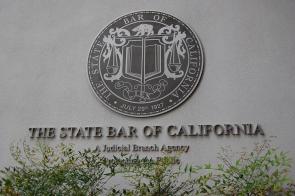
Why is this? Why is it acceptable in society this year to be an unemployed ibanker from Bear Stearns but still taboo to be a laid off associate from a Big Firm? Why are my i-banker friends embracing their layoffs as "opportunities to try on a new career" while my lawyer friends are hiding their feelings in therapy—and from their spouses. Why am I not seeing grad school advertisements, self-help books, job surveys, and articles featuring dynamic new practice area ideas for lawyers in The Metro Section of The New York Times? Who knows, but I believe this lack of recognition is casting an unnecessary shadow on those who have been laid off in this market. It is a HAPPENING (better known as that of which we do not speak) which is having an effect on those in the legal profession, and that effect is not a good one. Partners, counsel and associates who have been laid off are embarrassed. Law firms continue to hide their layoffs under cover of darkness – with some instructing associates who are let go not to speak of the layoff publicly. The secretive nature of "attorney turnover" is leaving much to the imagination and, as we all know, the imagination is often much more frightening than reality.
Society fears what it does not understand and, right now, a big part of society doesn't recognize or understand law firm layoffs because they aren't reading all that much about them in the papers each day. Thus, when one comes across a laid-off associate in the interview process or across the table at a cocktail party, it seems like an anomaly. Trust me, it's not. There are lots of them out there. It seems the only ones who truly know the extent of such layoffs are (i) those who are laid off and (ii) recruiters — as we spend 24/7 watching the industry, seeing our phones light up with calls from associates at the same firm (...which is the first hint of a layoff), and talking with partners who are suddenly looking for jobs as a "senior associate." The bottom line is that the extent of the turmoil in the legal marketplace for 2008 is high. If you have been laid off, or your firm is on shaky grounds, be aware that you are not alone. You may not be reported in The Wall Street Journal or The New York Times, society may not pity your demise, it may not feel cool to say "I'm taking the summer off" like your pal from Bear Sterns (because the whole world has read about his layoff), but many are in your shoes, and there are things you can do about it to come to terms with your situation.
Embrace Fear: Embrace Reality.
First, realize that ours is a profession which thrives in the panic room. As reported recently by James Dolan in the Texas Lawyer, "one must have a strong constitution to persist and thrive in law practice. . . . Many are attracted to the law precisely because of the fear factor. Many lawyers are fear junkies, unable or unwilling to conceive of a life of relative calm and low risk. . . . No matter what area a lawyer practices in, she must make an agreement with fear, for it is one of the central emotional features of the profession."1 In today's society, fear has a negative connotation, but it was not always so. Fear is very often seen as that which drives us to better ourselves. Fear can be good, and the inevitable high achieved upon conquering fear, can be the best feeling ever. Of course, when one gets laid off, we often see the dark side of fear – the uncertainty, the confusion, the disappointment. Welcome to reality. Inasmuch as fear made you feel fabulous when, in the face of fear, you nailed that oral argument or closed that deal — is as much as you feel like crap when you're told "you have 90 days." It's two sides of the same sword, and the best you can do is accept it like a dull hangover after a fine night of revelry. Just embrace the fear of the unknown which you may now be facing in the wake of a layoff because that is the best you can do, and the more you fight your feelings, or hide them, the stronger they will grow. After years of recruiting, I can tell you that those candidates who move on most quickly post-layoff are those who embraced such layoff as a business reality and a fact of life in an ailing economy. Taking matters personally won't help you; it will only prolong the anger, confusion, and fear. As referenced by Mr. Dolan "dealing with fear is something like owning a tiger. . . . We must know and accept its place of value in our world, be conversant with it and realize that, once you own a tiger, there is no easy way to get rid of it. And we must also understand that once we own the tiger, we don't have to take it with us everywhere we go."2
Take a Lesson from Your i-Banker Friends.
You may think your job was certain; you were the only one who thought so. Take a lesson from your corporate friends. In a recent survey of MBA students at 15 major business schools, "job security" came in a distant 10th on students' list of priorities for their careers.3 This does not mean that they did not want job security, it just means that the expectation of receiving the same is not exactly set in stone. So, why make it a priority? This is an important lesson. As more and more firms opt out of the traditional law firm business model and into a more "corporate derived" business model, more and more law firms are going to be run according to typical corporate rules. This means that when profits are down, people must often go. Testing this idea out on a friend of mine from Bear Stearns, I questioned whether he "saw this coming?" His response, "No, but nothing lasts forever. That's the way things go in the corporate world." I couldn't tell whether his comment was accepting and zen-like or irresponsible, but I went with zen as it seemed to jive with others' responses in the i-banking world. It was nothing personal; just business. A natural occurrence.
Does this mean it is wrong to hold the law up to a higher standard? A standard which protects the notion of law firm loyalty to its attorneys and vice versa especially in a down market? No, it's not wrong; it may just not be realistic anymore. As associates, partners and counsel demand more money, and law firms respond with higher pay, we may lose a little bit of the "family loyalty" in the process at some of our Big Firms. It's nothing personal; it's just business.
Must I Law?
One of the most important articles I've seen this year in The Wall Street Journal was entitled, "Must I Bank?"4 It addressed the fact that for many i-bankers, getting fired could be the best thing that ever happened to them.5 Not unlike i-bankers, those who enter the law field often do so based solely on the hope of earning a big income or at the urging of family members or parents who have high expectations. In other words, a career in law is sometimes undertaken without a real commitment to the field. There is nothing wrong with this type of motivation. However, it is worth mentioning that when one is laid off, it may be a good time to really consider the question: "Must I Law?"
To be frank, most lawyers would rather work a 2800 hour year than look inside themselves, but there it is. Your self is waiting for you. You might want to take a peek. Again, let's take some lessons from business school. As reported in The Wall Street Journal article referenced above, when business students announce that they have narrowed down their dream career to (i) investment banking, (ii) private equity, or (iii) a start up, the reality is that they haven't narrowed down their options at all as all of the above jobs fall into three very distinct categories mandating distinctly different talents and in which different kinds of people are likely to thrive. For example, investment banking is reported as the type of position for individuals "who feed on human interaction, . . . have natural
empathy . . . , do well in sales."6 Private equity is known as a more analytical and "solitary"7 profession. Start up work is an "operational job" requiring operators to "communicate and 'sell,' both internally and externally, . . . Operators must also be 'analytical' enough to attain the domain expertise needed to achieve credibility in their operating role."8
Can lawyers take a lesson from the above? Yes. According to such article, most jobs fall into one of these three categories: "Sales, analytical or operational" and "[t]he odds that the same person would prosper equally in more than one of these environments are low."9 While perhaps not 100% on point, we still might find a similar writing on the wall when comparing legal practices to legal practices. For instance, comparing patent litigation (largely sales or operational) to patent prosecution (analytical) yields an interesting result – the person who is strongly attracted to prosecution is probably not going to be attracted to bringing suit against Novartis. Attorneys who are laid off may do well to examine which practice they are currently specializing in and come to some sort of reckoning as to whether they really enjoy their work, are good at their work, and are well matched. Keep in mind that being good at something does not necessarily render you well matched. Attorneys tend to be Type-A personalities, which often means that they are good at lots of things. Being well-matched is a much more emotional response. Are you good at something because you enjoy your day and derive energy from your practice? There is a rule of thought which says that a truly successful person will discover their strengths and build upon them, while a marginally successful person will hone in on their own weaknesses and try to make them strengths in the illusion of selfbetterment. It's an interesting theory.
Considering the above, we may find some useful tools here. The morale of the "Must I Bank" article reviewed above told i-bankers that "[w]hatever the other negative ramifications of the current finance crisis, if bankers use it as an opportunity to ask themselves these questions they will likely be happier and, if they decide to stay in the profession, better bankers as well." The same goes for attorneys. Use your break in employment and/or three months notice period to undertake some introspection. It will make you a better lawyer in the long run and, if you leave the law, it will make you a better business person and direct you toward using your law degree to the fullest advantage for your career post-law.
The Secret Is Out
While the economy right now is problematic, and law firm layoffs still fly under the radar cloaked in whispers and innuendo, take comfort in the fact that you are not alone. While you may not get any measure of comfort from seeing the stories of others just like you on page 1 of The Post, it is likely that the woman standing next to you at Starbucks is probably in the same shoes as you—another quiet victim to the happening. Thus, my final piece of advice is this: Law firm layoffs are a natural part of the ebb and flow of Big Firm practice. It's not the layoff that will change your life. It's what you do after the layoff that will make the man...or woman. If you were laid off recently, begin today by telling somebody...your doorman, your neighbor, your husband (if he doesn't know), your wife (if she hasn't guessed). A secret only has power when nobody knows. As soon as it's spoken, the shadow is removed. And you are free to really move on, and chill out, this summer (just like your i-banker friend).
1 "Your Panic Room, Your Office," By James Dolan (Texas Lawyer as reported by New York Lawyer, April 23, 2008).
2 Id.
3 "M.B.A. Students: They're Not All Business," by Phyllis Korkki, The New York Times (quoting the Aspen Institute Center for Business Education), 2008.
4 "Must I Bank?" by Jonathan A. Knee, The Wall Street Journal, April 23, 2008,
p. A13.
5 Id.
6 Id.
7 Id.
8 Id.
9 Id.
About Harrison Barnes
Harrison Barnes is a prominent figure in the legal placement industry, known for his expertise in attorney placements and his extensive knowledge of the legal profession.
With over 25 years of experience, he has established himself as a leading voice in the field and has helped thousands of lawyers and law students find their ideal career paths.
Barnes is a former federal law clerk and associate at Quinn Emanuel and a graduate of the University of Chicago College and the University of Virginia Law School. He was a Rhodes Scholar Finalist at the University of Chicago and a member of the University of Virginia Law Review. Early in his legal career, he enrolled in Stanford Business School but dropped out because he missed legal recruiting too much.
Barnes' approach to the legal industry is rooted in his commitment to helping lawyers achieve their full potential. He believes that the key to success in the legal profession is to be proactive, persistent, and disciplined in one's approach to work and life. He encourages lawyers to take ownership of their careers and to focus on developing their skills and expertise in a way that aligns with their passions and interests.
One of how Barnes provides support to lawyers is through his writing. On his blog, HarrisonBarnes.com, and BCGSearch.com, he regularly shares his insights and advice on a range of topics related to the legal profession. Through his writing, he aims to empower lawyers to control their careers and make informed decisions about their professional development.
One of Barnes's fundamental philosophies in his writing is the importance of networking. He believes that networking is a critical component of career success and that it is essential for lawyers to establish relationships with others in their field. He encourages lawyers to attend events, join organizations, and connect with others in the legal community to build their professional networks.
Another central theme in Barnes' writing is the importance of personal and professional development. He believes that lawyers should continuously strive to improve themselves and develop their skills to succeed in their careers. He encourages lawyers to pursue ongoing education and training actively, read widely, and seek new opportunities for growth and development.
In addition to his work in the legal industry, Barnes is also a fitness and lifestyle enthusiast. He sees fitness and wellness as integral to his personal and professional development and encourages others to adopt a similar mindset. He starts his day at 4:00 am and dedicates several daily hours to running, weightlifting, and pursuing spiritual disciplines.
Finally, Barnes is a strong advocate for community service and giving back. He volunteers for the University of Chicago, where he is the former area chair of Los Angeles for the University of Chicago Admissions Office. He also serves as the President of the Young Presidents Organization's Century City Los Angeles Chapter, where he works to support and connect young business leaders.
In conclusion, Harrison Barnes is a visionary legal industry leader committed to helping lawyers achieve their full potential. Through his work at BCG Attorney Search, writing, and community involvement, he empowers lawyers to take control of their careers, develop their skills continuously, and lead fulfilling and successful lives. His philosophy of being proactive, persistent, and disciplined, combined with his focus on personal and professional development, makes him a valuable resource for anyone looking to succeed in the legal profession.
About BCG Attorney Search
BCG Attorney Search matches attorneys and law firms with unparalleled expertise and drive, while achieving results. Known globally for its success in locating and placing attorneys in law firms of all sizes, BCG Attorney Search has placed thousands of attorneys in law firms in thousands of different law firms around the country. Unlike other legal placement firms, BCG Attorney Search brings massive resources of over 150 employees to its placement efforts locating positions and opportunities its competitors simply cannot. Every legal recruiter at BCG Attorney Search is a former successful attorney who attended a top law school, worked in top law firms and brought massive drive and commitment to their work. BCG Attorney Search legal recruiters take your legal career seriously and understand attorneys. For more information, please visit www.BCGSearch.com.
Harrison Barnes does a weekly free webinar with live Q&A for attorneys and law students each Wednesday at 10:00 am PST. You can attend anonymously and ask questions about your career, this article, or any other legal career-related topics. You can sign up for the weekly webinar here: Register on Zoom
Harrison also does a weekly free webinar with live Q&A for law firms, companies, and others who hire attorneys each Wednesday at 10:00 am PST. You can sign up for the weekly webinar here: Register on Zoom
You can browse a list of past webinars here: Webinar Replays
You can also listen to Harrison Barnes Podcasts here: Attorney Career Advice Podcasts
You can also read Harrison Barnes' articles and books here: Harrison's Perspectives
Harrison Barnes is the legal profession's mentor and may be the only person in your legal career who will tell you why you are not reaching your full potential and what you really need to do to grow as an attorney--regardless of how much it hurts. If you prefer truth to stagnation, growth to comfort, and actionable ideas instead of fluffy concepts, you and Harrison will get along just fine. If, however, you want to stay where you are, talk about your past successes, and feel comfortable, Harrison is not for you.
Truly great mentors are like parents, doctors, therapists, spiritual figures, and others because in order to help you they need to expose you to pain and expose your weaknesses. But suppose you act on the advice and pain created by a mentor. In that case, you will become better: a better attorney, better employees, a better boss, know where you are going, and appreciate where you have been--you will hopefully also become a happier and better person. As you learn from Harrison, he hopes he will become your mentor.
To read more career and life advice articles visit Harrison's personal blog.





